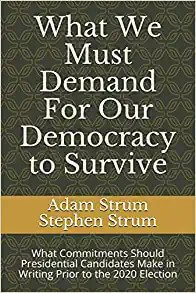What We Must Demand For Our Democracy to Survive

What We Must Demand For Our Democracy to Survive. What Commitments Should Presidential Candidates Make in the Writings Prior to the 2020 Election. Adam Strum and Stephen B. Strum. Independently published. 2020.
What We Must Demand For Our Democracy to Survive is an compelling book for Americans to consider to reclaim a civil public discourse. Admittedly anti-Trump, both authors nevertheless identify the economic and cultural problems that the country suffer and offer twenty-one proposals to help steer the country back to safe harbor. Even if one does not agree with every proposal, they are worthwhile of consideration because they identify some of the fundamental causes that ail our democracy.
The proposals are 1) term limits; 2) no social media; 3) no presidential authority over science and medicine; 4) tax breaks to help climate change; 5) visionary infrastructure; 6) promotion of domestic manufacturing; 7) review of the police; 8) creation of a works project administration; 9) putting non-violent criminals to work; 10) water aqueducts to prevent flooding; 11) teachers receive ample compensation; 12) a healthy water supply; 13) drug prices to be globally adjusted; 14) vetting major elected officials; 15) elimination of the electoral college; 16) non-citizens not given free healthcare; 17) visionary forest management; 18) increase the number of doctors and nurses; 19) outlaw semi-automatic weapons; 20) outlaw lobbyists from government agencies; and 21) make the veteran affairs the epitome of health care.
Needless to say there is enough here to upset both the political left and the right. One suspects the political left would object to no social media, water aqueducts, non-citizens being denied free healthcare, while the political right would reject tax breaks for climate change, the creation of a works project administration, review of the police, drugs prices to be globally adjusted, outlawing semi-automatic weapons, and the elimination of the electoral college. However, there are areas of possible agreement in term limits, visionary infrastructure and forest management, a healthy water supply, promotion of domestic manufacturing, putting non-violent criminal to work, and outlaw lobbyists from government agencies. Although it leans a little more left than right, the proposals are fairly balanced.
Instead of reviewing each proposal, which I would encourage the reader to do on their own, I instead want to examine the underlying philosophy of the book which is LUV: legacy, unity, and vision. For the authors, our political leaders need to think in these terms of what sort of legacy they want to leave for their fellow citizens after they leave office, how to unify the country, and what sort of vision to offer citizens so they are active members in our democratic experiment. While one may disagree with particular proposals by the authors, readers can see that this conceptual roadmap is a way to diagnose, analyze, and propose solutions to problems facing the country.
While written for the past presidential election, What We Must Demand For Our Democracy to Survive could be used for 2024; or, at least, these are some of the questions that the public could ask of the candidates. The book prompts reflection and debate and is worthy to read if one cares about the present and future of this country.




